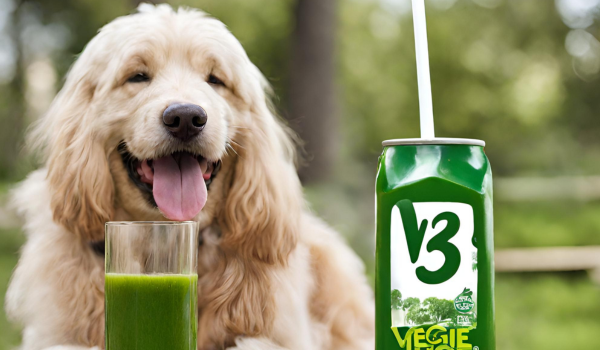Can V8 veggie juice benefit your furry friend? Perhaps you’ve heard about the potential health effects and are curious to learn more. In this article, we’ll delve into the impact of V8 veggie juice on dog health, exploring its potential benefits and considerations for conscientious pet owners.
Understanding V8 Veggie Juice
Have you ever passed by the juice aisle and spotted those vibrant vegetable juice cans known as V8? It’s buzzing with different veggies, promising a hefty punch of nutrition in every gulp. With ingredients like tomatoes, carrots, and beets, it’s a medley of vitamins and minerals. But before you even think about sharing this with your four-legged buddy, let’s dive into what this famous juice is made of and why it might catch the eye of health-conscious pet owners.
Understanding V8 Veggie Juice
Ingredients and Nutritional Content
Are you curious about what goes into that can of V8 that might end up in your dog’s bowl? It’s more than just a red liquid. V8 is packed with a mix of vegetables, and the original version is known to include tomatoes, carrots, celery, beets, parsley, lettuce, watercress, and spinach. These aren’t just random picks from the garden; they offer a complex array of nutrients like vitamins A and C, potassium, and dietary fibre.
But does a veggie medley in a can mean it’s automatically good for your pup? Nutrition-wise, the elements in V8 could sound like the perfect cocktail for a health boost. But it’s not that simple. A dog’s body processes food differently than ours, and what’s healthy for us doesn’t always translate to being beneficial for them. V8 has added ingredients like salt, which might not fit your dog’s dietary needs. So, while the veggie goodness could be a perk, the extras that come along for the ride? Not so much.
Pros and Cons of Introducing V8 Veggie Juice to Your Dog
Regarding your pup’s diet, branching out into human foods sparks curiosity and concerns. Veggies are great, but does the same hold valid for a veggie juice blend? Before pouring a little glass for your canine companion, let’s dive into the advantages and possible downsides.
Potential Health Benefits for Dogs
Have you ever watched your pup eyeing your plate of greens and wondered if they’re craving a bit of the good stuff? Well, those veggies packed into every bottle of our favourite garden blend juice might be more than a human perk. Nutrients like vitamins, minerals, and antioxidants could give your four-legged buddy a health boost, just as they do for you.
For instance, that vibrant cocktail contains vitamins A and C, which are great for maintaining shiny coats and a robust immune system. The juice also brims with potassium, helping your pet’s muscles and nerves function at their best. It’s a sippable salad that might keep Fido’s tail wagging with vitality. But remember, what’s a treat for you could be more complicated for your pet, so let’s not pour them a bowlful just yet.

Risk Factors and Considerations
When it comes to our canine companions, not everything that’s healthy for humans is suitable for dogs. V8 veggie juice, while packed with vitamins for people, poses some unique challenges for pups. It’s essential to remember that dogs have different dietary needs and restrictions, so what’s a nutrient powerhouse for us might not be ideal for them.
One main concern with adding V8 juice to your dog’s diet is its high sodium content. It is well-known that dogs need salt intake for optimal health. However, as with any other dietary element, too much salt can cause more harm than good and lead to severe health issues. Additionally, when choosing a supplement, such as V8, it’s crucial to read the label and understand what’s in the product. For instance, some ingredients like garlic and onion can be toxic to dogs, and always getting recommendations from your vet when considering new food for your pet is essential.
Safely Incorporating V8 Veggie Juice into Your Dog’s Diet
Curious about adding a splash of vegetable juice to your pup’s meals? It’s essential to proceed with caution. Like people, every dog is different, and what works for one may not be suitable for another. Let’s look at how you can safely add this colourful concoction into your doggo’s diet, keeping their tails wagging and their health in tip-top shape.
Recommended Dosage and Frequency
Regarding dogs and their diets, what’s good for humans isn’t always suitable for our canine pals. If you’re considering adding a splash of vegetable juice to your dog’s bowl, it’s important to do so with caution. Moderation is essential, as dogs have different nutritional needs and tolerances than we do.
Start with a small amount of veggie juice to see how your dog reacts. Think of a teaspoon for smaller breeds and a tablespoon for the larger ones. And this isn’t a daily treat—once or twice a week should be enough. But remember, each dog is unique, so what works for one may not work for another. It’s always best to consult a vet before making regular dietary changes. They can provide you with a tailored plan that best suits your dog’s health and lifestyle.
Alternative Options for Canine Nutrition
If you’re considering V8 juice for your dog but have second thoughts, there are plenty of other ways to boost their health. Whole foods, like carrots, green beans, and pumpkin, can be great treats and are jam-packed with nutrients. These snacks give your pet a health kick and keep them munching on something they’re naturally built to digest.
You could also explore commercial dog foods specially formulated with veggies and vitamins. They’re a safe bet because they balance nutrition with the right amount for your dog’s size and breed. Remember, when deciding what to feed your fluffy buddy, always think about what’s good for them, not just what seems healthy for humans.
Observing the Impact of V8 Veggie Juice on Your Dog
Once you’ve decided to integrate this veggie-packed beverage into your pup’s diet, it’s crucial to keep an eye on how it affects them. Watching your canine companion’s reactions to new foods is essential to ensure their health stays on track. Here, we’ll talk about caring for changes in your dog’s behaviour and physical condition that could explain how well they handle their new dietary addition.
Behavioural and Physical Changes
When you introduce something new into your dog’s diet, like vegetable juice, it’s essential to watch for changes in how they act or look. Physical changes might be easier to spot. Keep an eye on their coat — is it shinier or duller? Also, check if there’s a change in their weight, if they’re getting too skinny or putting on a few extra pounds.
For behavioural changes, notice if your pal is more energetic during walks or lounging around more than usual. Maybe they’re scratching a lot, indicating something’s not quite right. It’s stuff like this you want to catch early. If you notice any odd changes, it could signal to chat with your vet to see if the juice might be the cause.
Consulting with a Veterinarian
When thinking about adding anything new to your dog’s diet, it’s always intelligent to chat with a vet first. These experts know what’s best for your pup’s health and can offer personalized advice. They’ll consider your dog’s age, breed, health history, and current diet before giving a thumbs up or down.
Vets can also warn you about any possible side effects your furry pal might face. They suggest blood tests or regular check-ups to ensure your dog reacts well to the new addition. Remember, their goal is to keep your dog healthy and happy like yours!
Conclusion
As you navigate the world of canine nutrition, it’s vital to approach new dietary additions with a thoughtful and informed mindset. While V8 veggie juice may offer some potential benefits, it’s essential to prioritize your dog’s well-being by seeking professional guidance and carefully monitoring their response to any dietary changes.
- Smelly House Because of Dog? Take These Hygiene Tips - May 20, 2025
- How to Introduce a Dog To a Cats Without Chaos - May 6, 2025
- 4 Best Cavapoo Rescues in the UK 2024 - April 5, 2024








